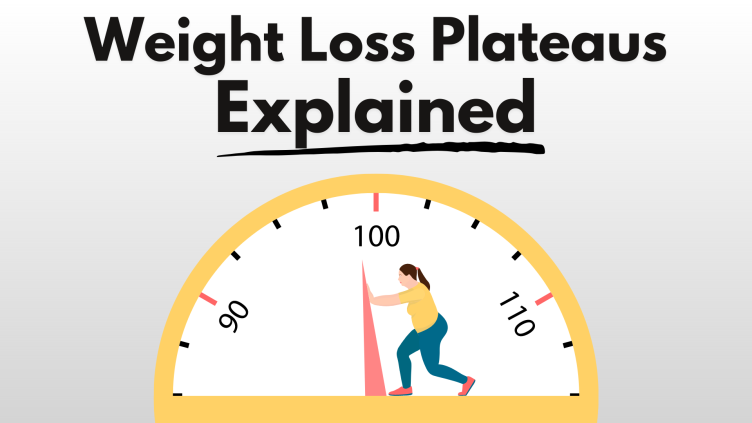
Table of Contents
Almost everyone on a weight loss journey hits a plateau when the scale stops budging despite continuing the same diet and workout routine. It’s frustrating. It can make you doubt your plan, your effort, even your goals. But plateaus are normal, and with the right adjustments and the right support they can be overcome. Here’s how plateaus work, why they happen, and how ProGen Weight Management helps you get past them and keep progressing.
What Is a Weight Plateau?
A weight plateau happens when, after a period of consistent weight loss, your weight levels off. You’re still doing what you’ve been doing: same foods, same workouts but the scale won’t budge. You may even feel like steps backward (fluctuations, slight gain, etc.). Plateaus can last from several weeks to months.
Think of it like this: your body adapts to the changes you’ve made. To lose extra weight, you’ll need further adjustments.
Why They Happen
Here are the main reasons weight loss slows or stops:
Metabolic Adaptation (Slower Calorie Burn)
As you lose weight, your resting metabolic rate (the energy your body uses at rest) drops. You’re lighter, so your body needs fewer calories for basic functions. Also, muscle loss (if it happens) contributes to slower metabolism.
Reduced Energy Expenditure Outside Exercise
Physical activity is not just planned workouts. Every bit of movement—walking, fidgeting, chores burns calories (known as NEAT: Non‐Exercise Activity Thermogenesis). As weight drops, people often subconsciously move less, reducing NEAT. This reduces overall daily calories burned.
Hormonal Changes
Losing fat alters levels of hormones that regulate hunger, fullness, and metabolism. Leptin tends to decrease (leptin tells the brain you’re full), ghrelin may increase (stimulates hunger), thyroid hormones can shift, etc. These make you feel hungrier and burn fewer calories.
Water and Glycogen Fluctuations
Early weight loss often comes from losing glycogen stores (in muscles and liver) and accompanying water. Once those drop, weight loss slows even if fat is still being lost.
Behavioural Creep / Habit Drift
Over time, people might slack off a bit, portion sizes creep up, snacks sneak in, intensity of workouts drops, or consistency fades. These small slips can offset the caloric deficit that was driving weight loss.
Set‐Point Theory or Resistance to Losing More
The body has built‐in mechanisms (sometimes called set‐point mechanisms) which resist weight loss beyond a certain level. Once you get below a certain body fat or weight, the body fights back (by slowing metabolism, increasing hunger) to defend against further loss.
Lifestyle, Stress, Sleep
Poor sleep, chronic stress, hormonal shifts (e.g. menopause, thyroid issues), illness these all affect hunger, energy, metabolism. If any of these are off, they can contribute to plateauing.
How Long Do Plateaus Last?
There’s no one answer. Some plateaus might be short, just a few weeks. Others may drag on for 8‐12 weeks or more. The important thing is not to give up prematurely, and to use the time to adjust smartly.
How ProGen Weight Management Helps You Break Through
Here’s how a program like ProGen can support you in pushing through plateaus and reaching your goals:
- Individualised Assessment and Calorie Re‐Calculation
When your weight drops, your calorie needs drop too. ProGen can help recalculate your maintenance needs and adjust your calorie intake so you’re always working with an appropriate deficit without under‐fueling. - Strength Training & Muscle Preservation
Resistance training helps preserve or even build muscle during weight loss. More muscle higher resting metabolism. ProGen includes protocols to maintain or build lean mass so your metabolism stays relatively higher. - Tracking Something Meaningful: Food, Activity, Progress
Accurate tracking helps you see where “slippage” (habit drift) might be happening, extra snacks, bigger portions, less movement. ProGen coaches use tracking of food, activity, sleep, stress to catch these early and help you adjust. - Varied Exercise Regimen
To avoid adaptation, ProGen includes progressive overload, variation (type, intensity, volume), alternating cardio, HIIT, resistance work. This keeps your body challenged. - Behavioural Support & Mindset Coaching
Plateaus are as much about psychology as about physiology. Staying motivated, dealing with discouragement, managing stress, getting good sleep all essential. ProGen offers coaching to help with habits, routines, and mindset so you stay consistent. - Lifestyle Optimisation: Sleep, Stress, Habits
ProGen helps with optimizing non‐dietary factors: ensuring 7‐9 hours of quality sleep, managing stress (because cortisol or stress hormones can hinder progress), ensuring recovery and rest days are built in. - Stay Flexible & Adjust Goals
Sometimes a plateau might signal that goals need tweaking. Not every target needs to be aggressive. Celebrating the progress so far and setting new realistic mini‐goals helps keep momentum. ProGen supports this kind of flexible planning. - Professional Check‐Ups
If you’re doing all this and still stuck for many weeks, ProGen can help with professional referrals or checks (thyroid, hormone profiles, etc.) to rule out medical causes.
Why ProGen Makes a Difference
What sets ProGen Weight Management apart is that it doesn’t treat plateaus as “failures” but as normal signals that the body needs a new strategy. We combine:
- Science‐based nutrition rather than fads or extreme diets
- Strength work and movement variety to maintain metabolism
- Ongoing behavioural support so mindset, sleep, stress are part of the plan
- Tailored adjustments rather than one‐size‐fits‐all rules
With ProGen, you don’t just push past plateaus, you build the habits and resilience to maintain weight loss long‐term, while feeling supported and confident.
Final Thoughts
A plateau doesn’t mean your plan has failed. It means your body is adapting. The key is not to stop but to adapt too: tweak nutrition, adjust workouts, pay attention to sleep and stress, and stay consistent. With the right support like ProGen Weight Management you can move past plateaus, regain momentum, and reach your weight goals more sustainably.
References:
1. Mayo Clinic Staff. Weight-loss plateau: Resting the scale. Mayo Clinic. https://www.mayoclinic.org/healthy-lifestyle/weight-loss/in-depth/weight-loss-plateau/art-20044615
2. National Center for Biotechnology Information (NCBI). The role of non-exercise activity thermogenesis in human obesity. https://www.ncbi.nlm.nih.gov/books/NBK576400/
3. National Center for Biotechnology Information (NCBI). Physiology, Leptin. https://www.ncbi.nlm.nih.gov/books/NBK538260/
Ready to Transform Your Body and Mind?

About Author – Siri Gowri
Siri is a Dedicated Clinical Dietitian with 3+ years of experience in weight loss and nutrition. She creates personalized, science-backed plans to help clients manage obesity, diabetes, and achieve lasting health.


